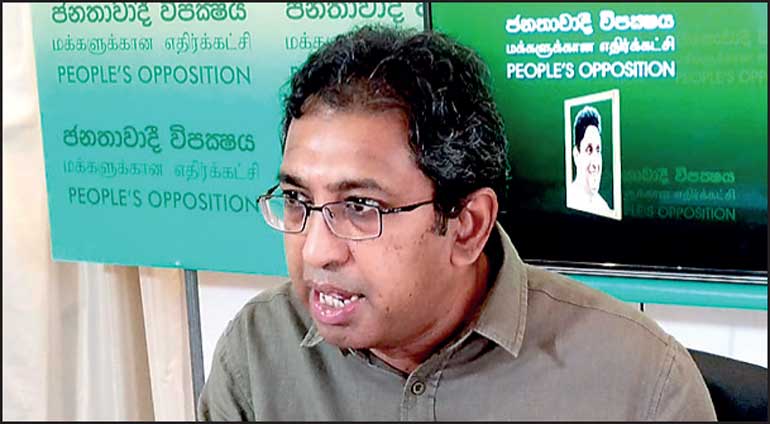Sunday Feb 22, 2026
Sunday Feb 22, 2026
Monday, 21 June 2021 00:30 - - {{hitsCtrl.values.hits}}

SJB Parliamentarian Dr. Harsha de Silva addressing the press at the Oppostion Leader's office
By Asiri Fernando
Samagi Jana Balawegaya (SJB) Parliamentarian Dr. Harsha de Silva yesterday alleged that the economy impacted by a worsening COVID pandemic is on the brink of collapse with the country facing a severe shortage of foreign exchange ahead of heavy debt repayment.
“Unless Sri Lanka reschedules its foreign debt and goes for an IMF program, the economy is on the brink of collapse as there are no dollars in the market for urgent imports,” de Silva claimed. “Failure will only add more damage,” he added.
Addressing the media, the SJB MP also said that the severe foreign exchange shortage isn’t a liquidity crisis but a solvency issue.
He said the crisis has manifested with Energy Ministry Secretary K.D.R. Olga confirming that the Government is considering an unsolicited loan of $ 1 billion to set off interest payments of loans CPC has obtained from the two State banks.
“This shows the sheer magnitude of the crisis,” he opined.
“Commercial banks are refusing dollar requests for urgent private sector imports,” he added.
Dr. de Silva also questioned how the Government, in just 12 months, had borrowed Rs. 2 trillion and for what purpose, whereas sharp criticism was against the Yahapalana regime’s Rs. 5.5 trillion borrowings over 60 months.
He said the Government needs to rethink their fiscal policies and act responsibly to avoid complicating economic woes in the coming months.
He charged that short-sighted policies of the Government have pushed the economy into a high-risk situation in the coming months. He stressed that had the Government worked with international financial markets, in particular, the International Monetary Fund (IMF) and restructured national debt repayment, Sri Lanka may have been able to avoid a dire economic outlook.
“The Government is pushing the economy to a high-risk situation. As a responsible Opposition, we strongly urge the Government not to let such a decline impact the public, who are already under pressure, and to take necessary corrective action,” Dr. de Silva stated. He made the comments at a press conference at the Opposition Leaders office and was joined by fellow SJB MP Mujibur Rahman.
Dr. de Silva explained that Sri Lanka needs to work with the international community and markets to avoid further economic setbacks, adding: “Had the Government heeded warnings six months ago and entered into a dialogue with the IMF to restructure debt, Sri Lanka would not be in this situation today.”
Commenting on the fuel price hike, Dr. de Silva dismissed claims by Energy Minister Udaya Gammanpila and State Minister of Money and Capital Market and State Enterprise Reforms Ajith Nivard Cabraal that the move was needed to prevent the banking system from collapsing.
“These are serious statements, Government Minister. I don’t think any minister has stated before that there was a risk of the banking system collapsing. What will happen if there is a collapse? The country will be bankrupt. What will happen to the savings of the public? How can the country trade?” Dr. de Silva questioned.
The Opposition MP criticised the Government’s tax policies and the management of national reserves, pointing out that that it had not delivered the desired effect.
Citing a Central Bank (CB) report issued last week on the status of the reserves, Dr. de Silva explained that there was a requirement of approximately $ 7,900 million to service the national debt over the next 12 months. He opined that Sri Lanka may be able to muster $ 5,500 million in total, taking into account state and private reserves, to service debt in a worst-case scenario. The Opposition MP pointed out that Government policies aimed at attracting foreign direct investments have failed and charged that a last-ditch effort was being made to sell land in key real estate in Colombo to boost reserves.
The Opposition MP criticised the Government for mismanaging international relations and for eroding the investment credibility of the country by pushing through ill-advised economic policies. “6.9 million Sri Lankans didn’t vote for a country to become a money-laundering hub with a crumbling economy,” Dr. Harsha de Silva added, urging the Government to rethink its fiscal policies before Sri Lanka’s economic woes get worse.
